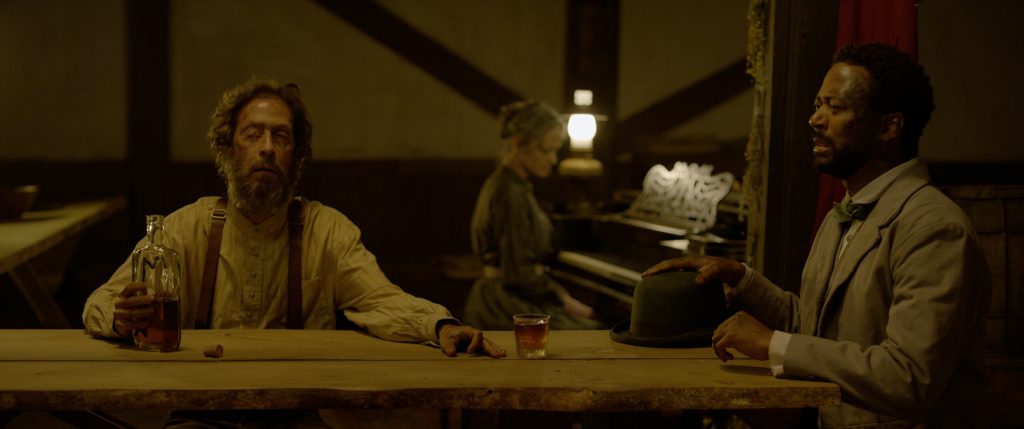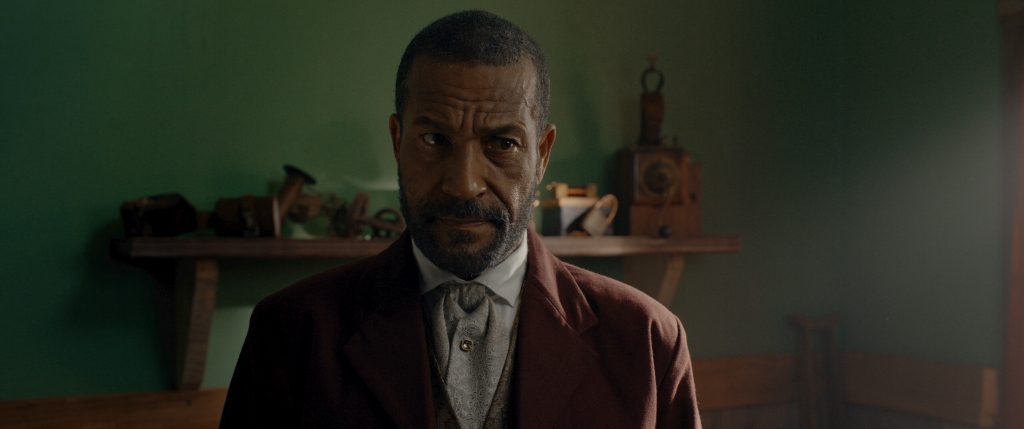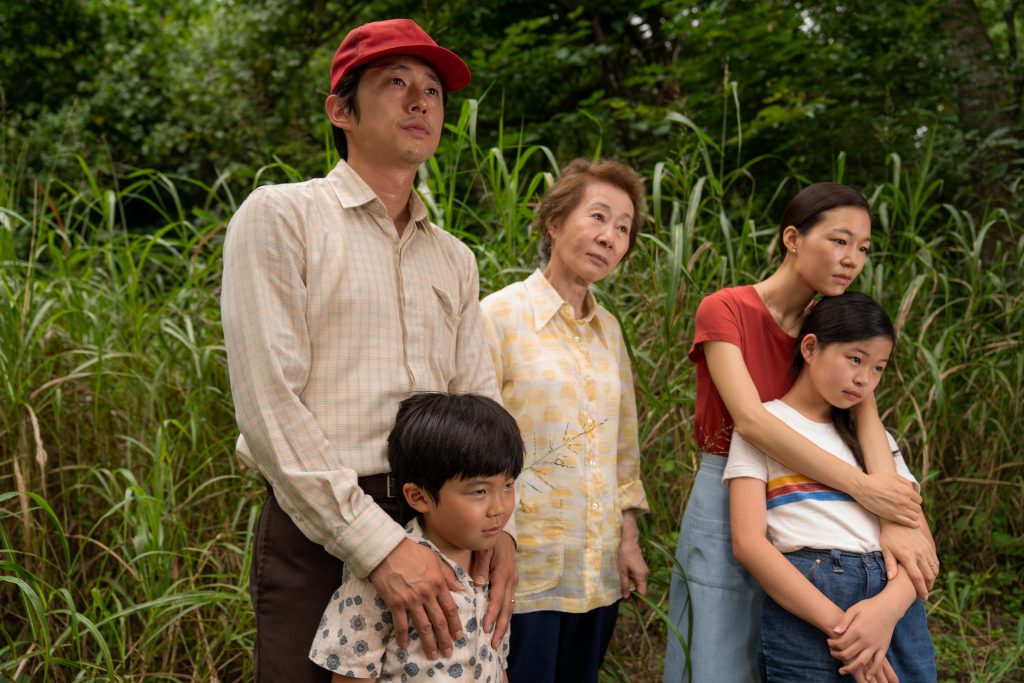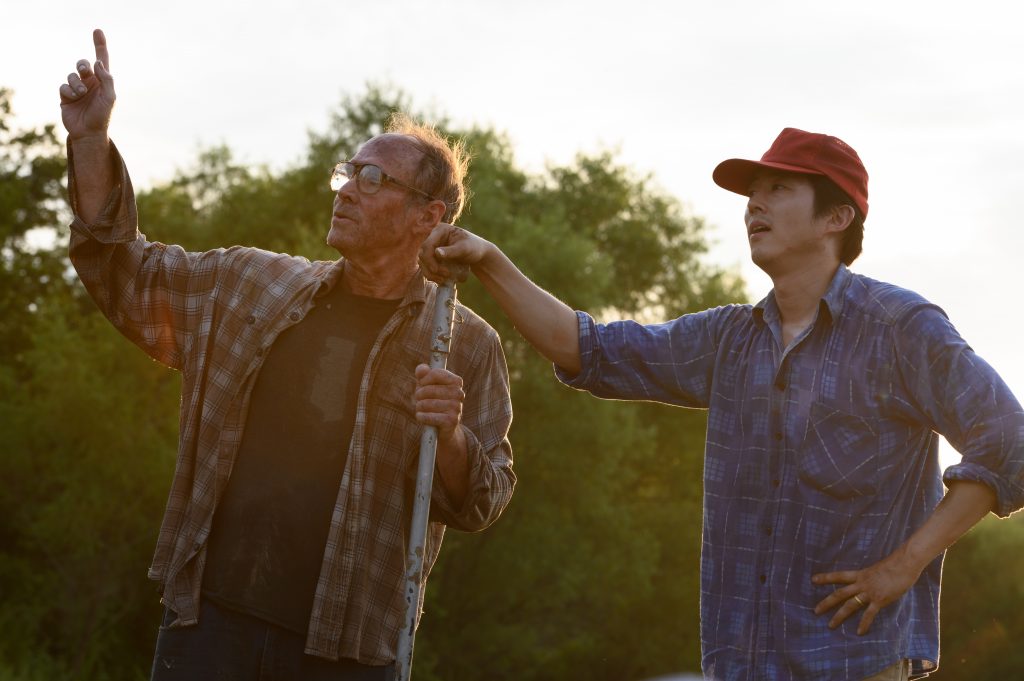February 17, 2022
by Carla Hay

Directed by Matt Glass and Jordan Wayne Long
Culture Representation: Taking place in 1860s Arkansas after the U.S. Civil War, the horror film “Ghosts of the Ozarks” features a predominantly white cast of characters (with a few African Americans) representing the working-class and middle-class.
Culture Clash: A young doctor is summoned by his uncle to live in a secretive community in Arkansas that is haunted by ghosts.
Culture Audience: “Ghosts of the Ozarks” will appeal mainly to people who don’t mind watching very boring and poorly written horror movies that aren’t very scary.

“Ghosts of the Ozarks” tries to make social commentary about power and race relations in Arkansas after the Civil War, but the intended message gets buried in a cesspool of sluggish storytelling and terrible acting. This horror movie also fails to be suspenseful or scary. The cheap-looking visual effects don’t help.
Matt Glass and Jordan Wayne Long co-directed “Ghosts of the Ozarks,” whose screenplay was co-written by Long and Tara Perry, with Sean Anthony Davis credited as a collaborating writer. Glass and Long also co-directed the 2018 horror comedy “Squirrel.” “Ghosts of the Ozarks,” which is not a comedy, has a simple concept that gets muddled with a lot of boring filler scenes that add very little to the story. In addition, many of the cast members give lackluster performances, as if the story is monotonous to them too.
In “Ghosts of the Ozarks,” which takes place in the 1860s sometime after the U.S. Civil War, physician Dr. James McCune (played by Thomas Hobson) has been summoned by his uncle Matthew McCune (played by Phil Morris) to live and work in a secretive rural Arkansas community named Norfolk, where Matthew is the leader. Norfolk is located in the Ozarks Mountain area. The movie was filmed on location in Arkansas.
James (who is African American) is eager to take the offer to become Norfolk’s doctor, because he wants a better life than the one he’s had. Racism has prevented him from getting the same opportunities as white doctors, so he wants to go to a place where he’s welcomed and appreciated. In addition to being a doctor in private practice, James has experience as a medic for the Union Army in the Civil War.
During his trek to Norfolk, James reads Matthew’s letter that convinced James to live in Norfolk. In the letter, Matthew says: “I invite you to Norfolk. It’s a sanctuary for all in these times. We like to keep to ourselves. We have need for a doctor with your skills. It’s a place unlike anything you’ve ever seen.” What Matthew doesn’t say in the letter, but which James finds out after he arrives in Norfolk, is that Norfolk’s previous doctor mysteriously disappeared.
James’ horse Ruthie runs away in the beginning of the movie, so James has to make the rest of his way by foot to Norfolk, through a heavily wooded area. It’s here that James gets the first clue that something might be strange about this place. He’s at a campfire by himself when a creepy-looking man named Micah (played by Scott Dean) approaches James in a suspicious manner and invites himself to join James at the campfire.
In a comment with racial overtones, Micah sneers at James, “It must be mighty nice, now that you’re free, you can go wherever you want.” James answers with confidence, “I didn’t need a war to be free.” Micah’s tone becomes even more hostile when he wrongfully accuses James of having precious stones. Micah then lunges at James and attacks him. But then, a mysterious red fog comes out of nowhere and pulls Micah into the fog, as Micah can be heard screaming in fright. James is also terrified, and he runs away.
When James arrives at Norfolk and tells Matthew what happened, Matthew nonchalantly tells James that the area is haunted by ghosts, which manifest themselves in the red fog. Matthew and James are the only African Americans in Norfolk. Everyone else is white. Toward the end of the movie, it’s haphazardly explained why an African American man in 1860s Arkansas was easily able to convince a white community to make him the leader, in a region of the United States where slavery of African Americans was legal just a few years earlier.
Matthew tells James why Norfolk is a utopia: “People here don’t care what you look like. Purpose is all that matters.” Throughout the movie, it’s repeated to the point of annoyance that everyone in Norfolk has a “purpose.” There’s also a wall that makes Norfolk a gated community. Security guards or “gatekeepers” are always at the entrance gate. Norfolk residents are discouraged from going outside the gates unless it’s to fulfill their “purpose.”
James doesn’t really believe in the supernatural, but Matthew says to James about the ghosts of the Ozarks: “They’re as real as I’ve ever known. They’re as magical as I’ve ever known. There’s not a soul [in Norfolk] who hasn’t come in contact with them. Most are wearing their history as their scars. The ghosts are real, boy. So are the walls. As long as that’s honored, each to his or her own purpose.”
Norfolk is filled with eccentrics. And because it’s a small community, everyone seems to know each other’s business. Torb (played by Tim Blake Nelson) is a quick-tempered blind man with an acute sense of hearing. He tends the bar/saloon at a local inn, where his gossipy confidante Lucille (played by Angela Bettis) likes to play the piano at the bar/saloon. The movie has a cringeworthy, out-of-place scene where Torb and Lucille perform an entire song together.
James also meets Douglas Giuseppe DuBois (played by David Arquette), who’s proud of the fact that he’s one of the few people in the area who has a camera and a photo studio. Douglas makes a living by taking studio portraits, but it’s later revealed that he uses his camera to take photos of people without their knowledge. Arquette is one of the least-believable 1860s characters in this movie’s cast. He just seems to be playing dress-up in a costume.
One of the Norfolk residents is a grandmother-age woman named Miss Roberts (played by Neva Howell), who is James’ first house call as a doctor in Norfolk. Miss Roberts has a girl living in her household named Emma (played by Skylar Olivia Flanagan), who’s about 7 or 8 years old. The movie is so poorly written, it never explains what Emma’s relationship is to Miss Roberts. Both of these characters get too much screen time, considering that they don’t do much, unless you think it’s fascinating that Emma sometimes goes outside the gated walls to fly kites.
Three other Norfolk residents who encounter James are an outgoing young man named Joe (played by Aaron Preusch), his socially awkward friend Mick (played by Brandon Gibson) and a middle-aged man named Jesse (played by David Aaron Baker), who is Emma’s uncle. Not long after James has settled in his own place at Norfolk, he has another unsettling experience one night: Joe suddenly bursts into James’ home and coughs up a lot of blood. James puts something that looks like a heat-glowing tongue depressor in Joe’s mouth, and Joe eventually recovers. The glow on this device looks supernatural, but it’s never explained why.
Outside the gated walls of Norfolk live two siblings who are the children of the doctor who disappeared: Annie Hunter (played by “Ghosts of the Ozarks” co-writer Perry) and her brother William Hunter (played by Joseph Ruud), a hulking and bearded man who doesn’t talk much. Annie and William used to live in Norfolk, but they were cast out by the community for not following the rules of “living your purpose.” The dislike goes both ways: Annie and William don’t think the community did enough to help find their father. Annie thinks of herself as an outspoken, gun-toting maverick, as if she’s Annie Oakley before Annie Oakley became famous.
Because James has been tasked with taking over the missing doctor’s clinic, he goes outside the gated walls to ask for Annie’s help to show him around and help set up the clinic. She reluctantly agrees. Over time, Annie and James develop an attraction to each other. Annie is also sought after by Mick, but she rebuffs his advances because she has no romantic interest in him.
As a Norfolk newcomer, James initially has a positive outlook on this place he now calls home, which he describes as a “haven.” Annie has the opposite opinion when she tells him: “This is a prison, James. They’ve convinced the inmates it’s a paradise.” If you consider why James has ended up in Norfolk, and who would have the most power to get things done, it’s very easy to figure out who’s the villain in this story. It really is that obvious.
Even though the movie has an obvious villain who isn’t revealed until the last third of the movie, there are things about “Ghosts of the Ozarks” that just don’t make sense. Micah—the man who attacked James in the beginning of the movie before being hauled off by the red fog—is found dead later near the Norfolk gates. James sees Micah’s body being carried away, while a Norfolk resident declares that the ghosts killed Micah. And yet, James doesn’t appear unnerved at all. And for all this talk in the movie about “purpose,” characters like Miss Roberts and Jesse seem to have no real purpose in the movie.
There are parts of “Ghosts of the Ozarks” that introduce ideas and then just leave these ideas to dangle with no real resolution. Emma’s kite flying didn’t really need to be in the movie, even though considerable screen time (about 15 minutes) is spent on this kite-flying activity. If it’s supposed to create tension that Emma could get in trouble for being outside the gates, then this intention fell flat. In addition to the strange heat-glowing device that James used to medically treat Joe, there’s also a brass wind-up device that James has brought with him, but he can’t get it to work. It’s another time-wasting part of the movie that’s never explained.
Early on in the film, Matthew asks James to find mushrooms for a “remedy” recipe that Matthew says can “work wonders” for Matthew’s health. It leads to a scene where James is digging for mushrooms in the woods at night, and he encounters the ghostly red fog again. It’s all so contrived and phony, because James could’ve easily been digging for mushrooms during the day. It’s yet another “Ghosts of the Ozarks” scene that’s weak on being scary.
Most of the acting in “Ghosts of the Ozarks” is downright awful and made worse by the idiotic dialogue in the movie. Nelson is the most acclaimed actor in this cast, but he plays a hollow caricature in this movie, which makes him look foolish with his corny overacting. At least Torb has something resembling a personality. James is as bland as bland can be, with Hobson giving a generic and forgettable performance to match.
“Ghosts of the Ozarks” gets dragged down with a lot of badly staged and tedious scenes about the social environment at Norfolk. It isn’t until the last third of the movie that it seems to remember that it’s supposed to be a horror story. A big showdown is rushed in toward the end. But just like this entire movie, it’s badly conceived, sloppily executed, and just one big letdown.
XYZ Films released “Ghosts of the Ozarks” in select U.S. cinemas, on digital and on VOD on February 3, 2022.


